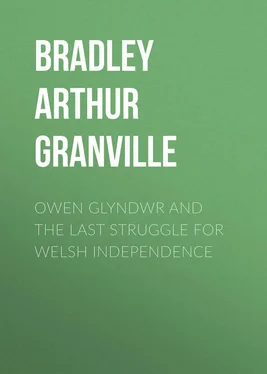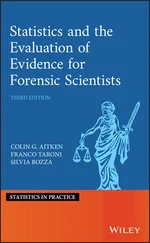Arthur Bradley - Owen Glyndwr and the Last Struggle for Welsh Independence
Здесь есть возможность читать онлайн «Arthur Bradley - Owen Glyndwr and the Last Struggle for Welsh Independence» — ознакомительный отрывок электронной книги совершенно бесплатно, а после прочтения отрывка купить полную версию. В некоторых случаях можно слушать аудио, скачать через торрент в формате fb2 и присутствует краткое содержание. Жанр: foreign_antique, foreign_prose, foreign_language, на английском языке. Описание произведения, (предисловие) а так же отзывы посетителей доступны на портале библиотеки ЛибКат.
- Название:Owen Glyndwr and the Last Struggle for Welsh Independence
- Автор:
- Жанр:
- Год:неизвестен
- ISBN:нет данных
- Рейтинг книги:5 / 5. Голосов: 1
-
Избранное:Добавить в избранное
- Отзывы:
-
Ваша оценка:
- 100
- 1
- 2
- 3
- 4
- 5
Owen Glyndwr and the Last Struggle for Welsh Independence: краткое содержание, описание и аннотация
Предлагаем к чтению аннотацию, описание, краткое содержание или предисловие (зависит от того, что написал сам автор книги «Owen Glyndwr and the Last Struggle for Welsh Independence»). Если вы не нашли необходимую информацию о книге — напишите в комментариях, мы постараемся отыскать её.
Owen Glyndwr and the Last Struggle for Welsh Independence — читать онлайн ознакомительный отрывок
Ниже представлен текст книги, разбитый по страницам. Система сохранения места последней прочитанной страницы, позволяет с удобством читать онлайн бесплатно книгу «Owen Glyndwr and the Last Struggle for Welsh Independence», без необходимости каждый раз заново искать на чём Вы остановились. Поставьте закладку, и сможете в любой момент перейти на страницу, на которой закончили чтение.
Интервал:
Закладка:
From every part of Wales came the cry of despairing Welshmen ground to powder by the insensate tyrannies of the King’s Bailiffs and the Lord Marchers, now left entirely to their own wild wills. Llewelyn’s third brother, Dafydd, who had played the part of King’s friend and traitor to his own people for most of his life, was rewarded by the Barony of Denbigh. It was the year 1281 and the time was now ripe for the last scene of the last act in this long, sanguinary struggle. Many of the chieftains of Wales, thinking, as they had often thought before, that death was preferable to the intolerable oppression from which the country now suffered, approached Dafydd at Denbigh and assured him that if he would even thus tardily be reconciled to his brother Llewelyn and lead them, they would strike yet one more blow for freedom. Dafydd, probably with their knowledge, was smarting under some real or fancied slight from his patron, King Edward, though maybe his heart was really touched at the extreme sufferings of his countrymen. At any rate he played the man to an extent that more than atoned for his unworthy past. Dafydd and his brother Llewelyn now met at the former’s castle upon the high rock of Denbigh, and there the Welsh chieftains who had declared for death or freedom rallied to the standard raised by the grandsons of Llewelyn the Great, and held upon “the craggy hill in Rhos” the last formal council of either peace or war that was to be recorded in the pages of Welsh history. The news of the proposed rising had reached England before Llewelyn had left his palace at Aber, and had caused some consternation. Edward and his barons had regarded the Welsh question as settled, and thought that on the death of the now pacified and uxorious Llewelyn the last vestige of independence would quietly lapse. The Archbishop of Canterbury was greatly distressed. He sent word to Llewelyn that he was coming to see him for the love he bore to Wales, and without the King’s knowledge; and he then, in actual fact, travelled all the way to Aber and used every argument, persuasive and coercive, he could think of to turn the Welsh Prince from what seemed a mad and hopeless enterprise. He threatened him with the whole physical power of England, the whole spiritual power of Rome. Never did the last Llewelyn, or indeed any Llewelyn, show a nobler front than on this occasion. For himself, he was materially well provided for and beyond the reach of the persecution that pressed upon most of his fellow-countrymen. But they had called to him in their despair, and desperate as the risk might be he had resolved to stand or fall with them. A schedule of conditions was sent him from the English King and his council, under which everything was to be overlooked, if only he and his people would return to their allegiance. Among other things an English county, with a pension of £1000 a year, was offered him in lieu of Snowdon. Llewelyn replied with scorn that he wanted no English county, that his patrimony was lawfully his own by virtue of a long line of ancestors; that even if he himself were base enough to yield up the Snowdon lordships, his subjects there would never submit to a rule that was hateful to them and had brought such misery on their neighbours of the Perfeddwlad. It was better, he declared, to die with honour than to live in slavery; and it may perhaps be repeated to his advantage that Llewelyn himself was only a sufferer so far as his proper pride was concerned, though it is possible he felt some pricks of conscience about the concessions made two years previously. At any rate he nobly atoned for them. There is evidence that admiration for the gallant stand made by this remnant of the Welsh was being kindled not only across the seas but even among Englishmen themselves. “Even Englishmen and foreigners,” says Matthew of Paris, who was assuredly no Welshman, “were touched with pity and admiration.”
Prince Dafydd, who was offered his pardon on condition of immediately repairing to the Holy Land, was equally stubborn, though perhaps the temptation to be otherwise was not so great. He replied to the effect that he had no intention of undertaking a Crusade at the dictates of others. However admirable was this tardy patriotism, his past record from that point of view was wholly dishonourable, for he had been consistently a King’s man. On the other hand, if, as was possibly the case with many Welsh nobles, he had sincerely believed that submission to English rule was the wisest thing for Welshmen, his abrupt repudiation of the man whose favours he had sought and received is not readily excusable. In this direction it is urged that the Anglo-Norman garrisons in these first years of Edward’s reign had made life so intolerable that Dafydd was sufficiently touched by his countrymen’s sufferings to risk everything and join his gallant brother in so forlorn a hope. “It was better for the kingdom at large that Wales should be governed,” wrote the brothers to Edward, “by her own Princes, paying that homage to the King of England which they had never refused, than by greedy strangers whose only thought was to oppress her people, despoil her churches, and advance their own private interests.”
The fall of the curtain upon this remnant of Welsh independence was now but a matter of a few months. Edward’s answer to the Princes was the despatch of a fleet to Anglesey, and of an army along the north coast route, containing large numbers of Gascons, and even some Spaniards. Edward himself went as far as Conway, meeting on the way with a heavy repulse and considerable loss in what was soon to be Flintshire. Dafydd, who was commanding in the north, was pushed into Snowdonia. The English army in Anglesey bridged the Menai with boats, and a strong detachment, crossing before the connection was complete, encountered the Welsh near Bangor. The invaders, however, were all cut off and slain in a fierce battle fought upon the shore, among them being many barons, knights, and squires.
These successes could only delay the end and exasperate the inevitable conquerors. Llewelyn, not wishing to be starved into surrender among the Snowdon mountains, had gone south to rouse the new shire land of Cardigan and Carmarthen, and the warlike Radnor tenants of the Mortimers. The Earl of Gloucester with another English army had meanwhile penetrated into South Wales and defeated a large force of Welsh patriots at Llandilo in the valley of the Towy.
Llewelyn came up, fighting his way through Cardiganshire, and had reached Builth on the Wye, when, on December 11th, he met his fate. The story of his death is too much confused, and there is no space here for repeating the slightly varying versions of the tragedy, but it seems quite clear that he was tempted away from the main body of his army by treachery, and slain when he was without arms in his hands. His head was struck off and despatched at once to King Edward at Conway, who, receiving it with great joy, sent it immediately by sea to his army in Anglesey. Thence the gruesome trophy was forwarded to London, where crowds of people met it outside the city and placed upon the gory brows a wreath of ivy in mockery of the old Welsh prophecy that a Prince of Welsh blood should once more be crowned in London. It was then fixed upon the point of a lance and carried in triumph through the streets to the pillory, and from the pillory to its final resting-place above the gate of the Tower.
Читать дальшеИнтервал:
Закладка:
Похожие книги на «Owen Glyndwr and the Last Struggle for Welsh Independence»
Представляем Вашему вниманию похожие книги на «Owen Glyndwr and the Last Struggle for Welsh Independence» списком для выбора. Мы отобрали схожую по названию и смыслу литературу в надежде предоставить читателям больше вариантов отыскать новые, интересные, ещё непрочитанные произведения.
Обсуждение, отзывы о книге «Owen Glyndwr and the Last Struggle for Welsh Independence» и просто собственные мнения читателей. Оставьте ваши комментарии, напишите, что Вы думаете о произведении, его смысле или главных героях. Укажите что конкретно понравилось, а что нет, и почему Вы так считаете.












